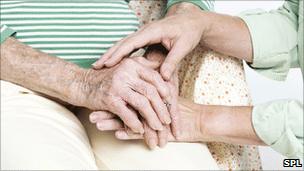Elderly care costs could treble says OECD
- Published

Some countries are struggling to recruit careworkers
The cost of caring for the elderly could treble by 2050, according to a report by the Organisation for Economic Cooperation and Development.
The body, which represents the most industrialised nations, estimates that 10% of people in OECD countries will be more than 80 years old by 2050.
That is up from 4% in 2010 and less than 1% in 1950.
The OECD report, external said member countries are spending 1.5% of GDP on long term care.
It predicts spending as a share of economic output will double or even triple in the next forty years.
Overhaul
The report said countries must face up to the challenge of caring for ageing populations. It said a vision of long term care was needed and that "muddling through" was not an option.
Angel Gurría, OECD Secretary-General, said: "With costs rising fast, countries must get better value for money from their spending on long-term care.
"The piecemeal policies in place in many countries must be overhauled in order to boost productivity and support family carers who are the backbone of long-term care systems."
However, the report warns against relying too heavily on family members. It says low pay and hard working conditions result in a high turnover of care workers and that many countries were struggling to meet demand.
It says Germany, the Netherlands and Sweden had all increased retention by boosting pay and improving working conditions.
The OECD also said there was likely to be an increased need for migrant workers.
- Published15 February 2011